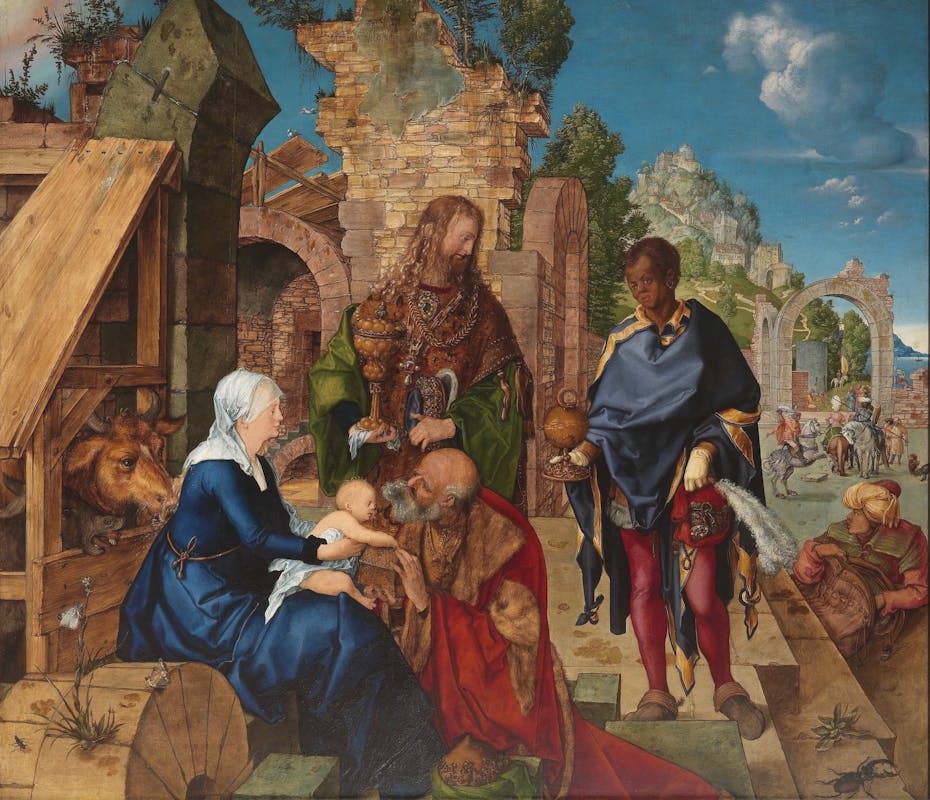The Biblical phrases come to mind readily today:
“Nations shall walk by your light.”
“Lord, every nation on earth will adore you.”
“Magi from the east arrived. . .to do him homage.”
“The Gentiles are now co-heirs with the Jews, members of the same body and sharers of the promise through the preaching of the Gospel.”
The Epiphany is the day for the Gentiles at the Crib. In a sense, today’s reading from Matthew presents the entire Gospel in miniature, in terms how the message was received by different audiences. Mary and Joseph represent the believing Jews; Herod, stiff-necked or faithless Jews; the Wise Men, Gentiles with open minds and hearts. A charming, ancient legend says that these Wise Men actually became the first Christian missionaries, meeting both success and failure among the Gentiles to whom they preached.
Surely, the point of this celebration is that “the Gentiles are now co-heirs with the Jews,” but how? St. Paul states: “Through the preaching of the Gospel.” If the barrier between Jew and Gentile is to be broken down, it will happen as both are brought into contact with the saving truth of Jesus Christ. That occurs through the process of evangelization, the sharing of the Good News, the Gospel.
This Solemnity, then, would have us reflect on the awesome task of evangelizing the world. Pope John Paul II symbolized that endeavor in a beautiful and powerful manner by consecrating on this feast new bishops from around the world. For through their work of preaching, teaching and sanctifying, the Gospel takes hold in new places among new peoples, who are made “members of the same body and sharers of the promise.”
A fundamental concern of the Church in every age must be the spread of the Gospel. For that reason, the Second Vatican Council’s document on missionary activity, Ad Gentes, taught: “The Church on earth is by its very nature missionary.” Pope Paul VI later emphasized the point in his landmark exhortation, Evangelii Nuntiandi. It is important to keep that fact in sharp focus because it is one of the distinguishing characteristics of Catholicism.
Judaism, for instance, has little interest in making converts; they are not turned away, but it’s not a major thrust. Nor is it so for the various Eastern religions, like Buddhism or Shintoism or Taoism. Even Eastern Orthodoxy and most of Protestantism have not had an evangelistic drive.
What makes us different? Nothing less than taking Christ at His word in His “Great Commission”: “Go, therefore, and make disciples of all nations, baptizing them in the name of the Father, and of the Son, and of the Holy Spirit, teaching them to observe all that I have commanded you.” (Mt 28:19)

And from Epiphany’s Magi to modern missionaries, the Gospel has been shared and taken root on every continent. Thus Germany has its Boniface and Ireland its Patrick. And 500 years ago, the so-called “New World” received the great blessing of being put into contact with the saving message of Jesus Christ through the selfless labors of dedicated clergy and religious. At times, the Gospel was not always properly preached and other concerns were allowed to get in the way.
But evangelization occurred, and is not only a work of the past; nor is it the responsibility of a chosen few; nor is it restricted to what we generally consider to be “mission territories.” Evangelization is the obligation and privilege of every baptized Christian at all times and in all places. John Paul called for a “new evangelization” aimed primarily some of the lands that first heard and accepted the Gospel, but have strayed through indifference or secularization.
He gave us the gift of the 1990 encyclical, Redemptoris Missio, on the Church’s perennial missionary mandate, in which he goes to great lengths to demonstrate several things:
1. Christ as the only source of salvation for the human race.
2. The Church as the necessary sign and instrument of that salvation.
3. The theological and inner stimulus toward evangelization on the part of all believers from the inspiration of the Holy Spirit
4 The primary focus of the Catholic mission to the world.
5. The ways dialogue should be conducted with those not in full communion with the one true Church of Christ, with non-Christians, and with non-believers.
6.The mutually supportive roles of all Catholics toward the total missionary movement. And:
7. The meaning of a missionary spirituality for all.
Why was this encyclical needed? Many people in the Church, through a confused and confusing form of ecumenism or inter-faith “dialogue,” had come to think that one religion is as good as another (“indifferentism”) and, therefore, that no one should attempt to bring anyone else into the Catholic Church. Even many full-time missionaries had bought into that mentality, reducing themselves, their work, and the Church to mere conveyers of social services, at best, or political – even violent – revolution at worst.
In light of the present pope’s rather consistent confused and confusing conflation of “evangelization” with “proselytism,” we need a serious re-reading of Redemptoris Missio.
Today the Magi bring the Infant Lord gifts of gold, frankincense. and myrrh. These surely pleased the Heart of God. But if those first seekers of truth then became the first Christian missionaries, the Heart of Christ must have been gladdened even more.
Do you want to offer “the new-born King of the Jews” a gift? I suggest that you resolve to be part of the Holy Father’s program of the re-evangelization of the First World and set as your goal presenting to the Lord one lapsed Catholic or one new believer in this new year. That gift would really mean something to Him. It would tell everyone that you are a worthy heir to the Magi.
Caspar, Melchior, Balthasar, pray for us, that we may be made worthy of the promises of Christ.
*Image: Adoration of the Magi by Albrecht Dürer, 1504 [Uffizi Gallery, Florence, Italy]














